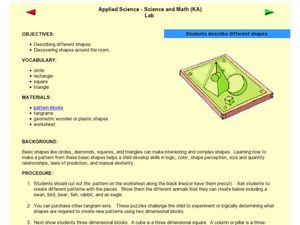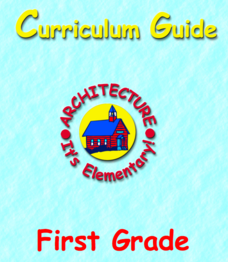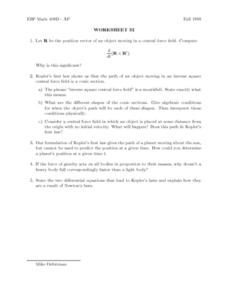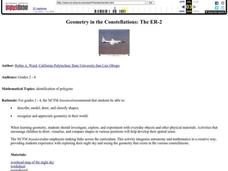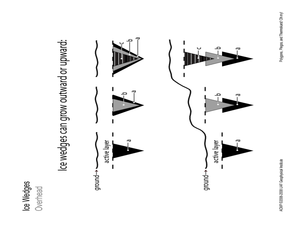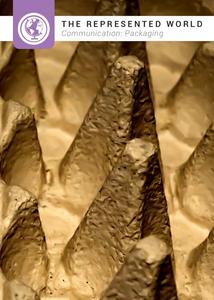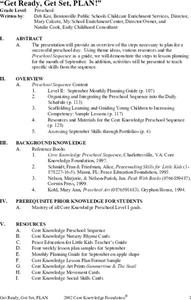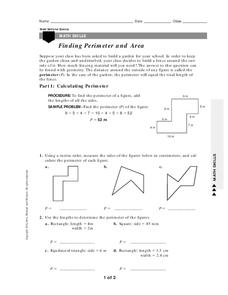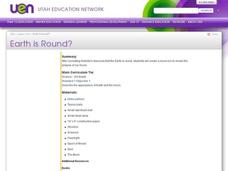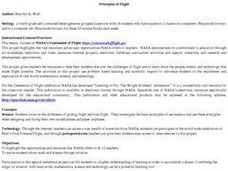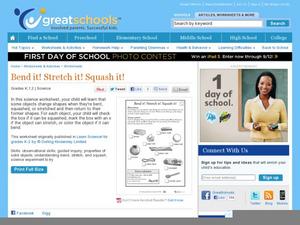Curated OER
Applied Science - Science and Math Lab
Create three dimensional objects in an applied science lesson plan. The goal is for your class to recognize, compare, and model shapes. Using cookie cutters and clay or play dough, they create models for three-dimensional shapes.
Curated OER
Applied Science - Science and Math (K) Lab
In this shape instructional activity, learners cut out tangram shapes and create different pictures with them. They look at 3-D shapes as well. There is a nice, hands-on component built into this instructional activity.
American Institute of Architects
Architecture: It's Elementary!—First Grade
Build an interest and appreciation for architecture in your young learners with this fun 10-lesson art unit. Engaging children in using their five senses, the class first observes the environment around them, paying...
Curated OER
Circles to Spheres
Students investigate circles and spheres. In this space shapes lesson, students compare and contrast two-dimensional and three-dimensional shapes. Students investigate the relationship between plane and space shapes.
Curated OER
Worksheet 32: Kepler's Law
In this math worksheet, students are given 8 questions regarding Kepler's first law of motion. The questions include definitions, short essay explanations, and formulaic expressions.
Captain Planet Foundation
Shape Shifters in the Math Garden
Combines mathematical measurement with gardening skills. Third graders hunt for worms in the garden and try to find the longest one. They also measure and weigh vegetables that they harvest from the garden, measure rainfall amounts,...
Curated OER
Symmetry that is Basic and Beautiful
Learners explore lines of symmetry. In this symmetry lesson, students divide and combine shapes along basic lines of symmetry. Learners explore symmetry in real life objects.
Curated OER
Geometry in the Constellations: The ER-2
Students discuss reasons to record the location of stars. They view a picture of the night sky, and discuss constellations. Students complete a worksheet of the various shapes they see in the constellations.
Institute of Electrical and Electronics Engineers
Sugar Crystal Challenge
Blow your learners' minds with a sweet instructional activity on nanotechnology that uses sugar to demonstrate the difference nanoscale surface area makes in dissolving and crystal formation. Plenty of supportive background information...
Curated OER
Strut Your Stuff
Young scholars begin the lesson by identifying what a polygon is and hypothesizing how many struts (diagonals) it would take to make a polygon rigid. They watch a "Magic School Bus" episode then experiment with various shapes to make a...
Santa Monica College
Introducing Measurements in the Laboratory
We use basic units of measurement to break down things and communicate clearly. The first lesson in an 11-part series teaches the proper way to measure various items. It starts simply with measuring the dimensions and areas of geometric...
Science Geek
VSEPR and Molecular Geometry
Many chemistry jokes have no reaction. Presentation begins by explaining what models are and the limitations of various forms before introducing the VSEPR model. Then it outlines the rules for creating a VSEPR model and shows examples of...
Curated OER
Polygons, Pingos, and Themokarst! Oh MY!
Students complete activities to learn about the common land features in Alaska. In this land study lesson, students study an overhead for permafrost features. Students define ice wedge polygons, thermokarst, and pingos. Students also...
Curated OER
Polygons and Vertices
In this geometry worksheet, students analyze different polygons and relate it to a circuit board. They find the odd degree Euler circuit and identify the vertices of the odd degree. There are 3 questions with an answer key.
Indiana Department of Education
The Represented World: Communication—Packaging
Challenge your classes to design and market a new product. Collaborative groups use geometry skills to create packaging for their products. Finally, they plan a marketing strategy to present to a marketing specialist.
Curated OER
Get Ready, Get Set, PLAN
Students complete the theme activities in the unit for the month of September. In this planning lesson, students complete various themed activities for the month of September. Students complete movement activities, autonomy and social...
Curated OER
Finding Volume
In this volume worksheet, students are given the equations for finding the volume of a cube and the volume of a prism. They solve two multi-part problems finding the volumes of different solids.
Curated OER
Finding Perimeter and Area
For this area and perimeter worksheet, students are given the equations to find the perimeter and area of objects. They practice finding the perimeter by measuring the sides of given objects and adding them together. They find the area...
Curated OER
Earth is Round?
Third graders discuss how Aristotle concluded that the Earth was round. As a class, they review theories about the Earth's shape and describe how life on Earth would be different if it were flat. Individually, they make a moon book in...
Curated OER
Dayna Lykins, Leanna Prater
Fourth graders compare and contrast gliding flight and true flight. They investigate the basic principles of aeronautics. The class participates in activities to observe lift and the effect of air. Students design and fly their own...
Curated OER
Modeling the Keeling Curve with Excel
In this modeling the Keeling Curve worksheet, students use given data beginning in 1960 to create a mathematical model for the changes in atmospheric carbon dioxide over time. Students manipulate the equation to predict the carbon...
Curated OER
Bend It! Stretch It! Squash It!
Some items keep their shape no matter what happens! Have your kindergarten class choose which items would stay the same if they were bent, stretched, or squashed. The last activity prompts kids to see what happens when they stretch a...
Curated OER
Wind Tunnels
Students build a simple wind tunnel and test out 2 glider wing shapes at different angles of attack. They record results and their observations just as engineers do.
Curated OER
Chemistry Day With Glitter Wands
First graders observe examples of the three states of matter and identify matter in each of the three states. They make glitter wands to remind them of the three states of matter: solid, liquid and gas. Pupils brainstorm and record...

